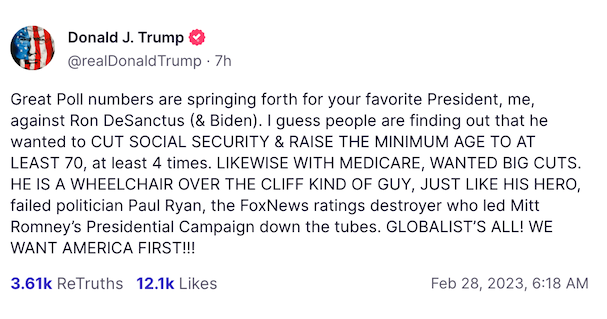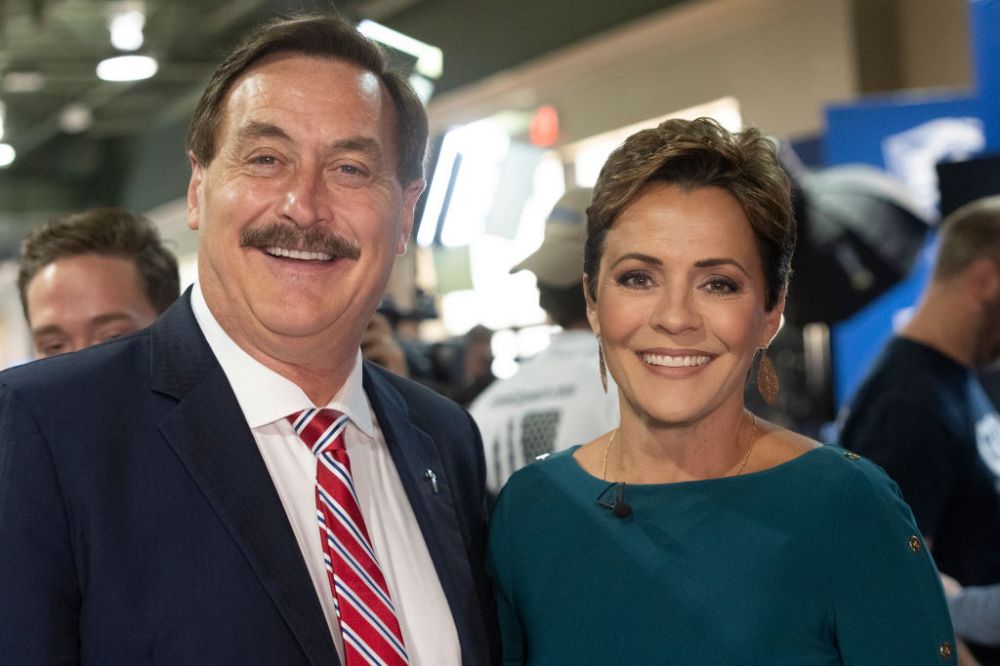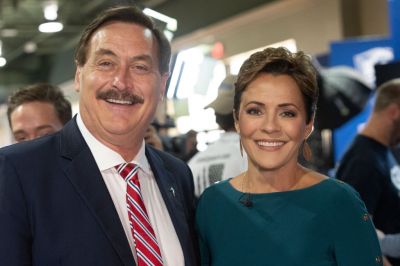The grandest event on the populist vaudeville circuit begins on Wednesday in Washington, D.C., but you wouldn’t know it from the coverage. News stories this week about the opening of the Conservative Political Action Conference have stressed the alleged diminishment of the gathering, hobbled by scandal and deprived of some of the Republican luminaries who would have surely attended in the recent past. “GOP Stars Flee CPAC,” NBC reports. “CPAC Has a Major Fox News Problem,” The Daily Beast marvels. “Is CPAC Losing Its Mojo?” The Week wonders.
Answer: Not really.
CPAC 2023 is a sordid freak show, but so was CPAC 2022, CPAC 2021, and quite a few CPACs before that. It’s a cliché yet true that one can chart the degeneration of conservatism over time from the declining quality of speakers year-to-year at the conference. “We are not a sick society,” Ronald Reagan said in his address at the inaugural CPAC in 1974. “A sick society—bereft of morality and courage—did not produce the men who went through those years of torture in captivity in Vietnam. Where did we find such men?” Forty-nine years later, at the nationalist-flavored CPAC of 2023, you’re more likely to hear a speaker “joke” that John McCain is burning in hell or presume to excommunicate McCain’s voters from the party than to hear sentiments from the stage like Reagan’s.
In the media’s telling, CPAC has lost influence due to l’affaire Schlapp. Matt Schlapp is the head of the American Conservative Union, CPAC’s parent organization; his outfit runs the conference and he traditionally serves as de facto emcee. A few months ago he was accused by a male staffer for Herschel Walker’s Senate campaign of having sexually assaulted the staffer by groping his crotch during a car ride. According to the Washington Post, “call logs, texts and videos provided by the Walker staffer and his confidants broadly match” the allegations, and no fewer than nine people told the paper that the staffer described the incident to them on the night it supposedly happened or the next day.
Trump-era Republicans can muster an inexhaustible amount of skepticism about sexual misconduct allegedly committed by one of their political heroes, but Schlapp isn’t their hero. He’s an apparatchik. They have no investment in him, so it’s a no-brainer to some to stay away from an event like CPAC to avoid being tainted by association. Several Republicans admitted to NBC that the Schlapp scandal is a factor in their decision not to attend this year while others are treating it as a welcome pretext: “Someone said to me, ‘We all wanted an excuse not to go, and Schlapp gave it to us.’”
As I scroll through the list of speakers scheduled for the event, though, I’m left to wonder: Who’s “we”? Who, exactly, is staying away? Practically everyone you’d expect to be there will be there, with one notable omission.
Well, two notable omissions. Viktor Orbán, who spoke at a CPAC event last year after expressing his disdain for race-mixing in Hungary, is also a no-show. I assume it’s an oversight.
Trump will be there. He’s the guest of honor, having been given the final speaking slot on the conference’s final day. I suspect Schlapp’s scandal made him more eager to attend rather than less: He loves to cultivate damaged people whom polite society wants little to do with because he knows how grateful they are for his patronage. He ends up owning them. When you’re too sleazy for everyone else, you can always find acceptance and community by embracing Trump’s “alternative morality.”
Various lesser seditionists will also address the crowd, among them Kari Lake, Marjorie Taylor Greene, Lauren Boebert, Steve Bannon, and of course the pillow guy. Vaccine skepticism will be represented in the persons of Candace Owens and Dr. Robert Malone. And Brazilian strongman Jair Bolsonaro will speak, filling the Orbán niche by feeding the crowd’s skepticism of democracy and extolling the virtues of post-liberal authoritarianism. It’ll be a veritable parade of Good Ideas.
The rest of the roster is filled out by the usual mix of populist media celebrities and ambitious Republican politicians desperate to ingratiate themselves to the sort of voter who cares about populist media celebrities. If you want to know who wears the pants in the modern Republican Party, examine the schedule of speakers for each day at CPAC and note who’s opening for whom. In a (slightly) saner party, a character like Candace Owens might be ushered onstage briefly to share her thoughts on how Kanye did nothing wrong before making way for former CIA Director and Secretary of State Mike Pompeo. At CPAC, it’s the opposite: Pompeo will warm up the crowd at 5 p.m. on Thursday before Owens closes the day’s events with her own address at 5:35.
It’s the same story on Friday. Nikki Haley, a presidential candidate who governed South Carolina and served as U.S. ambassador to the U.N., will speak in garbage time at 12:45 p.m., just before Lara Trump. The prime slots at the end of the day have been reserved for Bannon, Brexiteer Nigel Farage, and Kari Lake, who’ll keynote the—deep breath—Ronald Reagan Dinner. The problem with CPAC isn’t merely that it offers a platform to “insurrectionists, weirdos, and freaks,” to borrow Joe Scarborough’s phrase, it’s that it exalts the insurrectionists, weirdos, and freaks above the party’s more credible officials. That’s what attendees want, so that’s what the conference gives them.
And that’s why some Republicans won’t attend. Mitch McConnell, Kevin McCarthy, Ronna McDaniel, and Mike Pence aren’t skipping CPAC because they fear being hit with an attack ad featuring Matt Schlapp. They’re skipping CPAC because they fear being hit by tomatoes thrown by the crowd. All four are “establishmentarians” despised or disdained by the sort of populists to whom the event caters and know they’d be received with hostility if they showed. Pence in particular might not feel physically safe at an event like this one after the Great Betrayal of January 6.
Fox News might also be staying away over fears of hostility. If you’re Haley or Pompeo, you have nothing to lose by punching your ticket to this kook carnival in hopes of building goodwill with base voters who are apt to greet you with nothing worse than indifference. If you’re a Fox News host, though, you might worry that you’ll be jeered for the revelations about the prime-time lineup scoffing at the Big Lie behind the scenes in 2020. (Especially with Trump flogging Fox lately.) A news outlet founded by Roger Ailes necessarily has a high tolerance for sexual misconduct, so here again it’s not a matter of Matt Schlapp having scared away the network. It’s a matter of avoiding damage to the network’s conservative credibility by ducking an event where a roomful of right-wingers might treat Fox as a traitor in full view of television cameras.
Contrary to the media’s heavy-breathing about CPAC losing currency, then, practically every decision by prominent figures to attend or not attend can be easily explained by their standing with populist Republicans. If you’re momentarily favored (or at least not despised), you’ll be there. If not, not.
Which brings us to the notable exception. Where’s Ron DeSantis?
The official explanation for him missing CPAC is that he has a scheduling conflict. It’s nonsense.
CPAC is a four-day event. DeSantis presumably could have sought and received any speaking slot he liked save for Trump’s (and, perhaps, Lake’s) to accommodate his timetable. He had every reason to want face time with the audience, too. He just published a book and is building out a travel itinerary in the early primary states; he’s clearly preparing to run for president and CPAC has been a launchpad for presidential candidates dating back to its Reagan heyday. It’s passing strange that he would skip a prime populist political showcase like the conference when he intends to compete for Trump’s voters this year.
His “jam-packed” schedule this week includes “several stops in Florida to promote his new book, as well as GOP dinners in Texas and an appearance at the Club for Growth’s annual donor retreat.” (Nikki Haley will also attend the Club for Growth retreat—in addition to her appearance at CPAC.) Given that most speeches at the conference run 20 minutes or less, how is it that DeSantis couldn’t delay or postpone any of his other events to accommodate a short flight to Washington to signal his respect for the freak show?
In fact, why were his book events and dinners in Texas scheduled in the first place for the week CPAC is held? The conference always goes on around this time of year.
DeSantis is running on electability, remember. We should nominate him rather than Trump, the theory goes, because he’s broadly acceptable to traditional conservatives and MAGA populists. He can unite the GOP, Trump can’t. So here he is, on the eve of launching a campaign, inexplicably snubbing the annual showcase event for one of the party’s two wings. Why?
I have three theories, none of which I’m very confident in.
One is that he’s regrettably concluded that CPAC is a “Trump event” and it will do him more harm than good to compete there. He spoke at last year’s conference in Florida; Trump spoke too. In the end, Trump crushed him in the CPAC straw poll, 59-28. No one cared at the time because the 2024 primary was still on the far horizon and DeSantis didn’t have much of a public profile outside conservative activist circles. Having now won reelection in Florida in a landslide and emerged as a national figure, expectations have risen. The results of the CPAC straw poll should provide a tiny inkling as to whether there’s truly an appetite for DeSantis among populists.
If he shows up, speaks, and gets crushed again—a distinct possibility given some of the national polling—it’ll jumpstart media narratives that he’s a paper tiger and unable to pry away MAGA voters from Trump after all. That’s not the kind of publicity he needs at the start of a campaign. Solution: Skip CPAC, then when Trump crushes him in the straw poll anyway, shrug it off and say that things would have been different had he shown up.
Another theory is that DeSantis believes he has nothing left to prove to populists and can afford to take them for granted while he pivots to wooing conservative donors. It was literally just yesterday that he declared victory over “Woke Disney” in Florida, wasn’t it? Before that, he was consumed with smashing the progressive intellectual infrastructure at the New College of Florida. He’s shoveling culture-war red meat into the collective maw of Republican voters faster than they can suck it down. When you’re putting up as many W’s as he is, you don’t need to gladhand populists at CPAC—or so Team Ron might tell us.
I’m not so sure.
Yesterday Jonathan Last noted astutely how Trump is straining to maneuver DeSantis into the “establishment” lane of the coming primary. If the governor can convince Republicans that he’s a unity candidate with a unique ability to serve the interests of both sides of the party, Trump really might be in trouble. But if Trump can convince his voters that DeSantis is little more than Paul Ryan in a MAGA cap ...

… then DeSantis’ image among populists as “Trump, but electable” might begin to crumble. Last writes:
Republican voters have shown over the last 7 years that they like insurgents. Trump’s problem in running for 2024 is that it’s hard to be an insurgent when you’re the former president.
But the entire Republican / conservative establishment congealing around DeSantis solves that problem. It makes DeSantis—who otherwise might be a fresh face—into the establishment behemoth. And it makes Trump into the insurgent fighting to purify the rigged Republican party.
If I were Ron DeSantis, with Trump working overtime to recast me as a closet establishmentarian, I might worry about what sort of message I’m sending by blowing off a gathering of populist true believers for the sake of gladhanding rich donors at an event hosted by a pre-Trump mainstream policy shop like the Club for Growth.
The third theory is that DeSantis didn’t skip CPAC at all. He was muscled out of a speaking slot by Trump’s people.
Last year I found it curious that the governor was the first person to speak when the conference opened in Orlando. Granted, he was “welcoming” attendees to his home state, but he was a major star among activists even a year ago. Typically a young talent with a large and growing fan base would have been slotted into an evening speech, perhaps the keynote at the Reagan Dinner. Instead DeSantis was pushed into a sort of concierge role at the start of the convention. Was that by design, I wondered—or because Trump or one of his lackeys dialed up Schlapp and said, “Listen up, because this is how it’s going to be”?
Now that DeSantis is poised to enter the race, it would make sense for Trump to apply pressure to try to freeze him out of this year’s event entirely. It would also be in character for him to approach Schlapp with a “him or me” loyalty test. “Remember who invited you to Mar-a-Lago after the news about your scandal broke,” Trump might say. “Think carefully about which side you take here, because if you choose wrong and I win the nomination, you’ll never be forgiven.”
This is a man prone to pressuring people in his way by threatening to release dirt about them. What might an avid gossip collector like Trump, who was thick as thieves for years with the sleaze merchants at the National Enquirer, circulate about Schlapp if Schlapp refused him a favor?
It’s speculation, nothing more. But DeSantis’ conspicuous absence from CPAC makes more sense as involuntary rather than voluntary exile. And Trump has, allegedly, been in a “him or me” state of mind lately with respect to some of his toadies. Recently, when Charlie Kirk of Turning Point USA began showing too much interest in DeSantis, TrumpWorld made its disgruntlement public. “Trump feels like he has made Charlie and Charlie’s ungrateful and [Trump’s] not been happy for a while,” one adviser told NBC. “I see that [Kirk’s] trying to cover all his bases. Trying to triangulate between Trump and DeSantis. And Ron may not care, but Trump notices.”
Two days before that was published, news broke that the outfit Students for Trump had opted to reclaim web domains and social media accounts that it had leased to Turning Point since 2019.
Him or me. Sides are being chosen. If you doubt which side Matt Schlapp would choose if forced to do so, reflect on the fact that last year he said he believed Trump would lead the conservative movement “until he takes his last breath.”
Then again, if DeSantis were being iced out of CPAC, wouldn’t that have leaked to some media outlet by now?
I end with a warning to those who relish the possibility that CPAC really might be losing influence: Be careful what you wish for.
“Ticket sales are lagging from past years, prompting price cuts, giveaways and a special rate offered to congressional staff,” sources told the Washington Post of this year’s event. “Many high-rollers who have in the past bought the conference’s biggest premium packages have not registered this time.” I could be wrong in suspecting that reports of the conference’s demise are greatly exaggerated. People who’d like CPAC to be less of a freak show will savor the idea.
But they shouldn’t. Whatever succeeds CPAC after it’s gone won’t look like this, I fear. It’ll look like this. Nothing will get better on the right until the quality of information it consumes improves drastically and there’s zero prospect of that happening soon. What comes after CPAC will be worse.







Please note that we at The Dispatch hold ourselves, our work, and our commenters to a higher standard than other places on the internet. We welcome comments that foster genuine debate or discussion—including comments critical of us or our work—but responses that include ad hominem attacks on fellow Dispatch members or are intended to stoke fear and anger may be moderated.
With your membership, you only have the ability to comment on The Morning Dispatch articles. Consider upgrading to join the conversation everywhere.